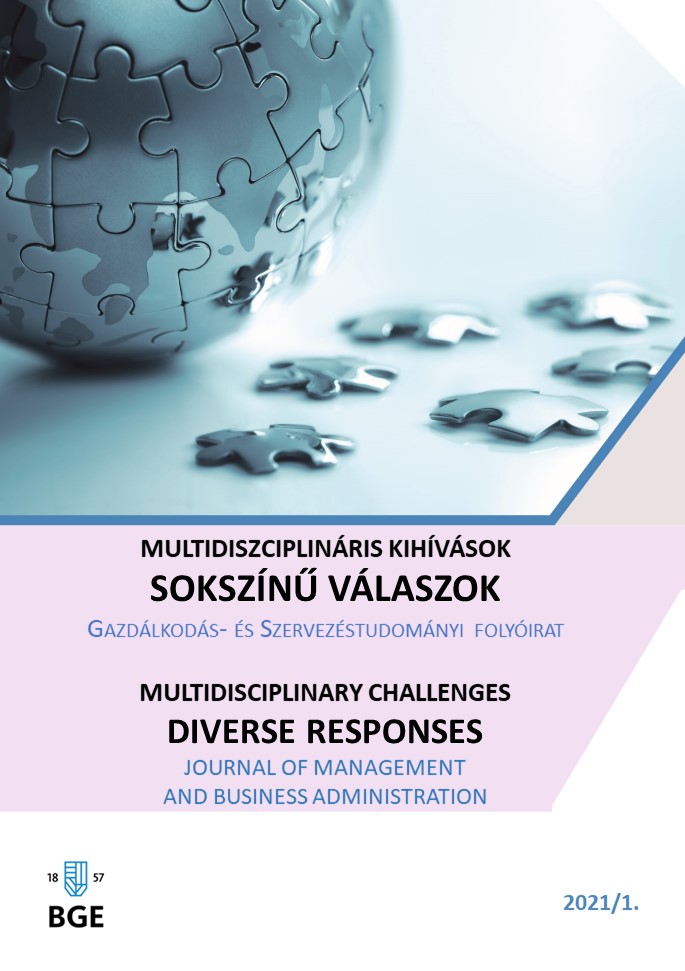Long-Term Vision For Rural Areas
Empirical Research Focusing On AKIS In Hungary
Abstract
The European Commission initiated the preparation of a new long-term vision for rural areas. First step of this process was the launch of a public consultation to which also the Horizon 2020 SHERPA (Sustainable Hub to Engage into Rural Policies with Actors) project is making a contribution on behalf of 20 different Multi-Actor Platforms (MAPs). The Hungarian MAP - a group of science-society-policy actors - focuses on the Agricultural Knowledge and Innovation System (AKIS), more precisely digitalization. The topic of Agricultural Knowledge and Innovation System - is a horizontal issue and it is embedded even into the Common Agricultural Policy’s (CAP) strategic planning process. Being part of it, the development of AKIS requires close and intensive cooperation of policy makers, researchers and farmers or in broader context the society with various stakeholders.
The aim of the Hungarian research was to identify the current and likely trends for the Hungarian rural areas and to point out key challenges, opportunities, enablers and hinderers in rural development in terms of the Agricultural Knowledge and Innovation System (AKIS) up until 2040.
The methodology used was the Delphi technique. In the first phase, a review of key trends, main challenges and opportunities and a summary of existing foresight regarding digital agriculture was written. Then AKIS experts were asked to talk about their experiences and opinions in the framework of interviews, a focus group meeting and a survey. In the end, results of the survey were discussed in a consensus meeting.
Among the results, it is worth mentioning that digitization and digitalization will fundamentally change the way rural areas operate including economic, environmental and social dimensions. The main enablers of a promising future vision are capacity building for knowledge transfer, adaptation for job creation and offering better quality of life, stronger community building for collaborations, deeper government involvement, and last but not least, strengthening the local identity in rural areas.
References
ABREU, I. & MESIAS, F.J. (2020). The assessment of rural development: Identification of an applicable set of indicators through a Delphi approach. Journal of Rural Studies. Vol. 80. pp 578-585. https://doi.org/10.1016/j.jrurstud.2020.10.045
Artificial Intelligence Strategy of Hungary 2020-2030 /Magyarország Mesterséges Intelligencia Stratégiája 2020-2030/ - https://ai-hungary.com/files/91/a6/91a660a69ab58a3622af834694e2f31f.pdf
BioEast Initiative /BioEast kezdeményezés/ - https://bioeast.eu/
CUNHA, A. & SWINBANK, A. (2009). Exploring the Determinants of CAP Reform: A Delphi Survey of Key Decision‐Makers. Journal of Common Market Studies, Vol. 47(2). https://doi.org/10.1111/j.1468-5965.2009.00803.x
Declaration - A smart and sustainable digital future for European agriculture and rural areas (2019) https://ec.europa.eu/digital-single-market/en/news/eu-member-states-join-forces-digitalisation-european-agriculture-and-rural-areas
Digital Education Strategy (2016) https://digitalisjoletprogram.hu/files/0a/6b/0a6bfcd72ccbf12c909b329149ae2537.pdf
Digital Export Development Strategy of Hungary (2016) https://digitalisjoletprogram.hu/files/a5/23/a523883ca591ddd299de3fafe5bdfbec.pdf
Digital Start-up Strategy of Hungary (2016) https://digitalisjoletprogram.hu/files/89/ea/89eac5ce5f74178f3f527945f7edd08f.pdf
Digital Welfare Program 2.0 (2017) https://digitalisjoletprogram.hu/files/58/f4/58f45e44c4ebd9e53f82f56d5f44c824.pdf
EC (2019a): A smart and sustainable digital future for European agriculture and rural areas. Declaration. https://ec.europa.eu/newsroom/dae/document.cfm?doc_id=58563 EC
European Commission (2019b) Analytical factsheet for Hungary: Nine objectives for a future Common Agricultural Policy https://ec.europa.eu/info/sites/info/files/food-farming-fisheries/by_country/documents/analytical_factsheet_hu.pdf
European Commission (EC) (2020a) Digital Economy and Society Index (DESI) 2020 Country Report, Hungary - https://ec.europa.eu/digital-single-market/en/scoreboard/hungary
European Commission (EC) (2020b) Digital Economy and Society Index (DESI) 2020 Integration of digital technology https://ec.europa.eu/digital-single-market/en/integration-digital-technology-enterprises
GAÁL, M. (ed.), Humenyik N., Illés, I. (ed.), Kiss, A (2020): Situation and economic assessment of precision arable crop production /A precíziós szántóföldi növénytermesztés helyzete és ökonómiai vizsgálata/, Agricultural Books /Agrárgazdasági Könyvek/, NARIC Research Institute of Agricultural Economics /NAIK Agrárgazdasági Kutatóintézet/ Budapest. http://repo.aki.gov.hu/id/eprint/3655
Government of Hungary (2015) Digital Success Programme -https://digitalisjoletprogram.hu/en/about
European Union (2018) Digital Transformation Scoreboard 2018: EU businesses go digital: Opportunities, outcomes and uptake https://ec.europa.eu/growth/tools-databases/dem/monitor/sites/default/files/Digital%20Transformation%20Scoreboard%202018_0.pdf
HAMZA, E., RÁCZ, K., SZABÓ, D. & Vásáry V. (2019): Contribution of agricultural vocational training to the labour supply 2018 /Az agrárszakképzés szerepe a munkaerő-utánpótlásban 2018/. NARIC Research Institute of Agricultural Economics /NAIK Agrárgazdasági Kutatóintézet/ Budapest. http://repo.aki.gov.hu/3471/1/Agrarszakkepzes_2018_web_pass.pdf
JUHÁSZ, A (2019): National Digital Agriculture Strategy (NDAS) https://www.itu.int/en/ITU-D/Regional-Presence/Europe/Documents/Events/2019/Telecom19/3-Juhasz%20Aniko_AGMF.pdf
LINSTONE & TUROFF (2002). The Delphi Method Techniques and Applications. Addison-Wesley Educational Publishers Inc. https://web.njit.edu/~turoff/pubs/delphibook/delphibook.pdf.
Ministry of Agriculture (2017) The Concept of Food Economy of Hungary 2017-2050. Quality food for Hungary and for the world. /Magyarország élelmiszergazdasági koncepciója. 2017-2050 Minőségi élelmiszert Magyarországnak és a világnak/ https://2015-2019.kormany.hu/download/0/07/11000/%C3%89lelmiszergazdas%C3%A1gi%20Program%202017-2050.pdf
Ministry of Innovation and Technology (2019a): Strategy of Strengthening of the Hungarian SMEs 2019-2030 /A magyar mikro-, kis- és közepes vállalkozások megerősítésének stratégiája/ https://2015-2019.kormany.hu/download/6/f7/b1000/KKV_Strategia.pdf
Ministry of Innovation and Technology (2019b) Vocational training 4.0 Strategy /Szakképzés 4.0 stratégia/ - https://www.nive.hu/index.php?option=com_content&view=article&id=1024:szakkepzes-40-strategia&catid=10:hirek&Itemid=166
Ministry of Innovation and Technology (2020): Research, Development and Innovation Strategy of Hungary 2021-2030. Draft version
National Digital Agriculture Strategy /Digitális Agrár Stratégia/ - https://ivsz.hu/digitalis-agrar-strategia/
National Digitalization Strategy 2021-2030/Nemzeti Digitalizációs Stratégia 2021-2030/ - https://2015-2019.kormany.hu/download/f/58/d1000/NDS.pdf
PESCE, M., KIROVA, M., SOMA, K., BOGAARDT, M-J., POPPE, K., THURSTON, C., MONFORT BELLES, C, WOLFERT, S., BEERS, G. & URDU, D. (2019): Research for AGRI Committee – Impacts of the digital economy on the food-chain and the CAP, European Parliament, Policy Department for Structural and Cohesion Policies, Brussels. https://www.europarl.europa.eu/RegData/etudes/STUD/2019/629192/IPOL_STU(2019)629192_EN.pdf
RIKKONEN, P., TAPIO, R. RINTAMÄKIA, H. Visions for small-scale renewable energy production on Finnish farms – A Delphi study on the opportunities for new business. Energy Policy 129. https://doi.org/10.1016/j.enpol.2019.03.004
SHERPA (2020) SHERPA Discussion Paper. Long term vision for rural areas. Contribution from 20 science-society-policy platforms. https://rural-interfaces.eu/wp-content/uploads/2020/07/SHERPA_Discussion-Paper_Long-term-vision-rural-areas.pdf
THANGARATINAM, S. & REDMAN, C. (2005). The Delphi technique. The Obstetrician Gynaecologist. 2005;7:120–125. https://doi.org/10.1576/toag.7.2.120.27071


























